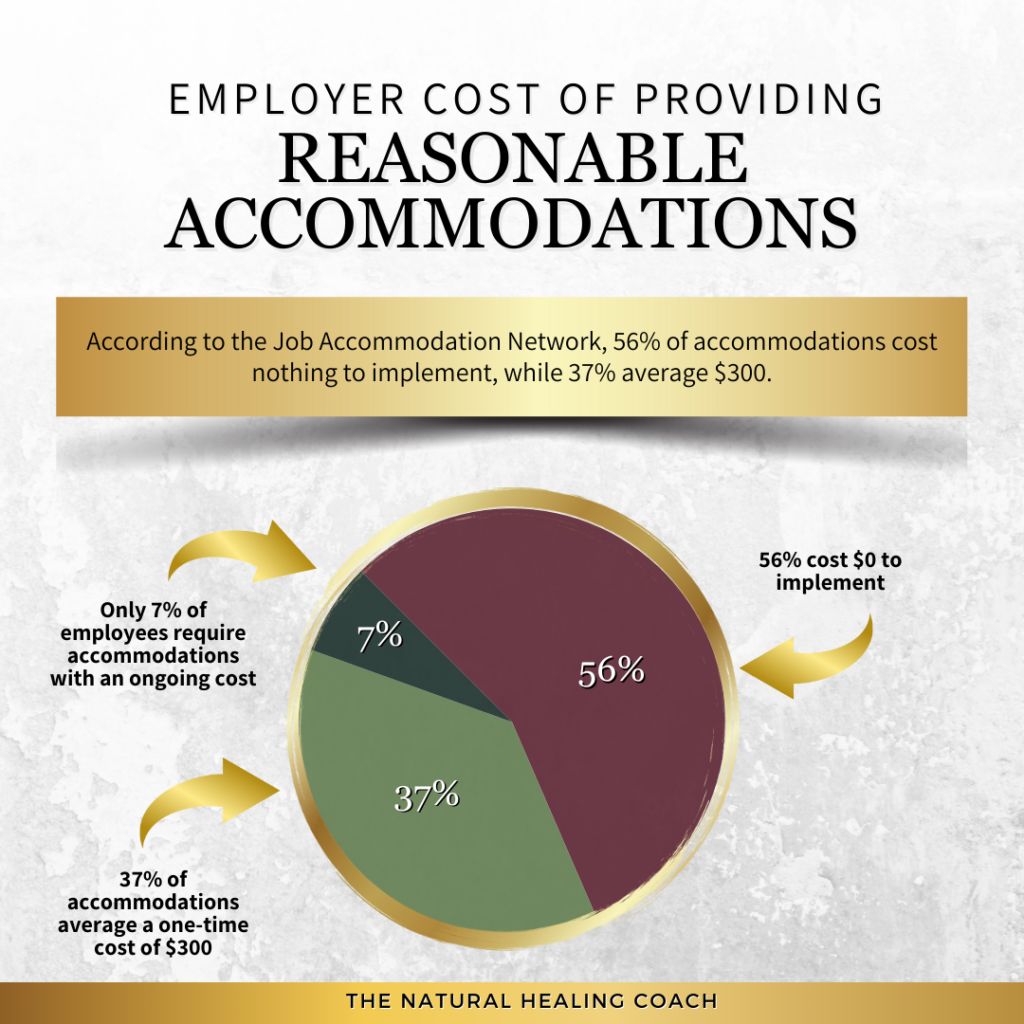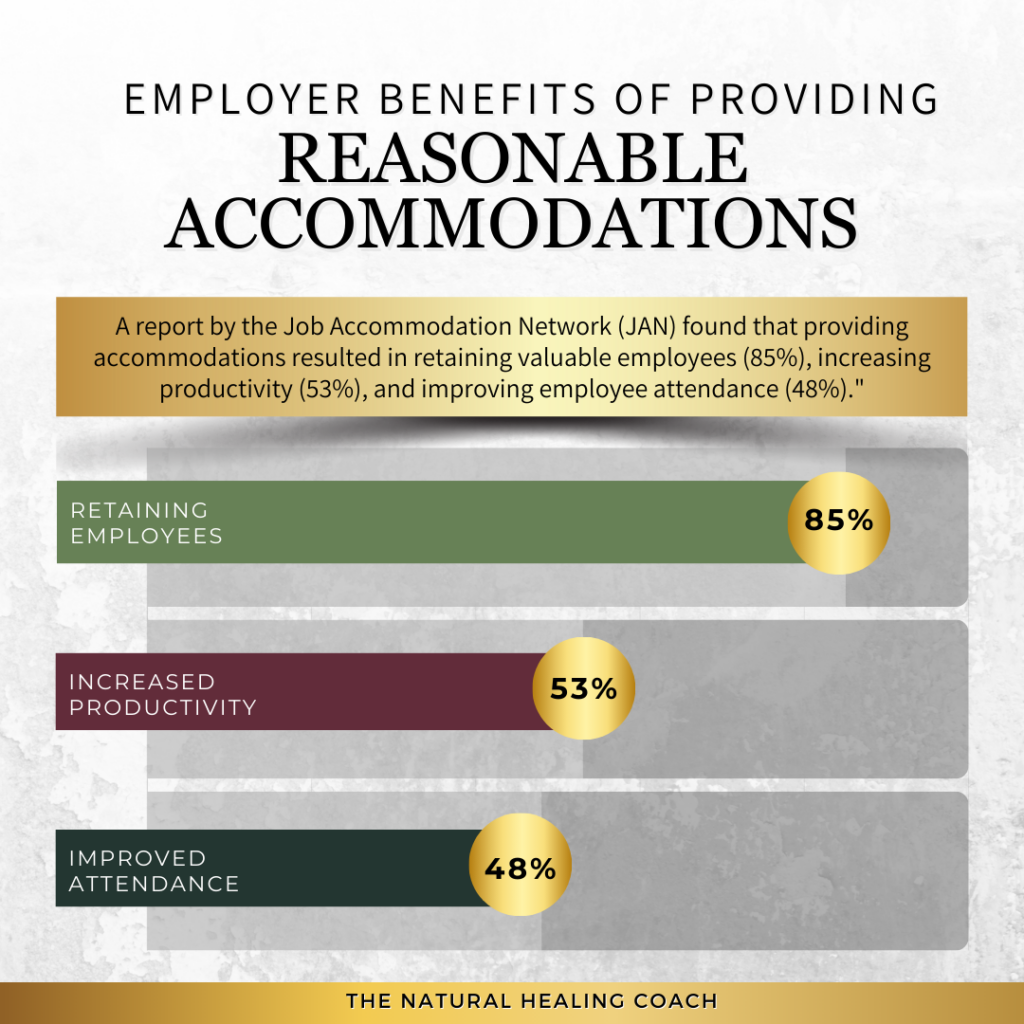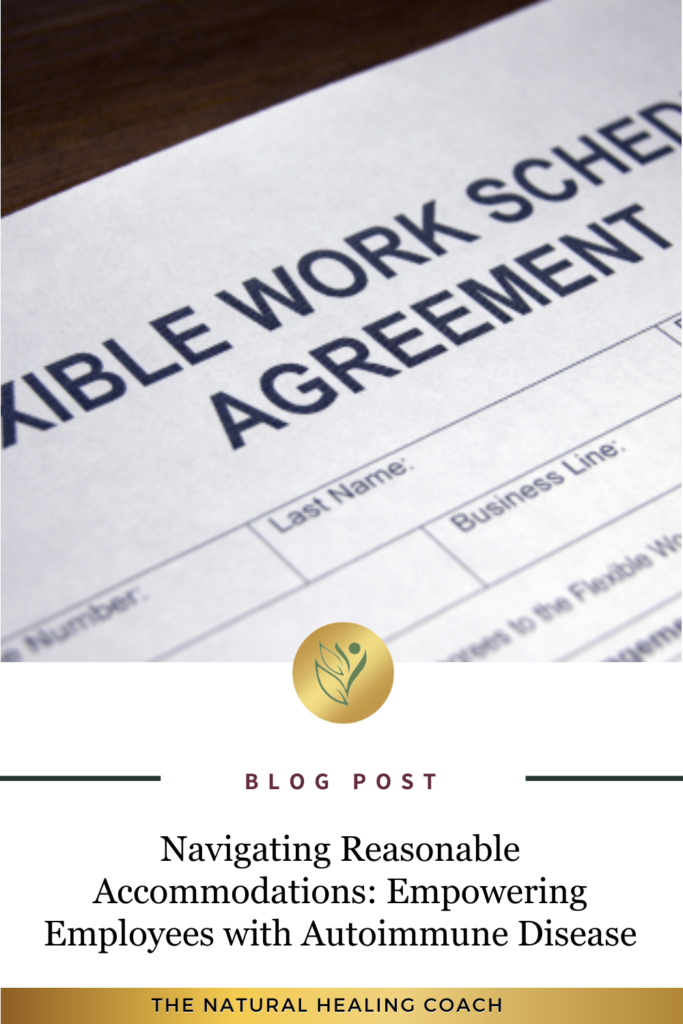Introduction
Living with an autoimmune disease changes how you work. Symptoms like fatigue, pain, and cognitive fog can make it challenging to maintain your usual pace and routine. But this doesn’t mean your work quality and quantity have to suffer. With the right support and reasonable accommodations, you can continue to be a valuable and productive employee.
Workplace accommodations are essential for maintaining productivity and health for individuals with autoimmune diseases. These accommodations might include flexible work hours, remote work options, ergonomic workstations, and modified job duties. Unfortunately, many employees suffer in silence because they aren’t aware of their rights, and often, neither are their employers.
Knowing your rights and advocating for yourself can make a significant difference in managing your health and maintaining your performance at work. Share on X
The benefits of reasonable accommodations extend beyond just the individual to the entire organization. Consider these compelling statistics from the Job Accommodation Network (JAN):
- 56% of accommodations cost nothing to implement.
- 37% of accommodations involve a one-time cost, with a median expense of $300.
These statistics highlight that the cost of accommodations is relatively low, while the benefits are substantial:

- 85% of employers retain valuable employees through accommodations.
- 53% see increased employee productivity.
- 48% notice improved employee attendance.
Additionally, accommodations can lead to broader organizational benefits:
- 47% eliminate costs associated with training new employees.
- 33% experience increased diversity in their workforce.
These figures from JAN’s Workplace Accommodations: Low Cost, High Impact report demonstrate that implementing accommodations is a cost-effective strategy that benefits both employees and employers, creating a win-win situation for all.
This blog aims to provide guidance on how to request and secure necessary workplace accommodations effectively. By understanding and leveraging these rights, individuals with autoimmune diseases can ensure they continue to thrive professionally while managing their health.
Understanding Reasonable Accommodations
Reasonable accommodations are adjustments or modifications provided by an employer to enable people with disabilities, including those with autoimmune disease, to perform their job duties. Under the Americans with Disabilities Act (ADA), a reasonable accommodation is any change to the work environment or the way things are usually done that allows an individual with a disability to enjoy equal employment opportunities.
KEY POINT: These accommodations must not cause undue hardship to the employer.
Accommodations are crucial for managing autoimmune disease in the workplace. Autoimmune conditions often come with unpredictable symptoms such as fatigue, pain, and cognitive difficulties, which can hinder an individual’s ability to perform their job effectively. Reasonable accommodations help mitigate these challenges, allowing employees to maintain productivity and perform their job duties effectively. They also contribute to overall job satisfaction, reduce absenteeism, and enhance employee retention. By supporting employees through accommodations, employers can foster a more inclusive and supportive work environment.
Examples
Here are some common examples of reasonable accommodations for autoimmune disease patients:
By implementing these accommodations, employers can significantly improve the working conditions for employees with autoimmune diseases, helping them to thrive both personally and professionally.
Preparation for Requesting Accommodations
Assessing Personal Needs and Limitations
The first step in preparing to request accommodations is to assess your personal needs and limitations related to your autoimmune condition. Reflect on how your symptoms impact your ability to perform your job duties. Consider factors such as:
- Which tasks are most affected by your symptoms?
- What times of day do your symptoms typically worsen?
- How does your work environment impact your condition (e.g., lighting, noise, temperature)?
- What specific changes or support could help you manage your symptoms better?
Understanding these aspects will help you identify the accommodations that would be most beneficial for you.
Medical Documentation
To support your accommodation request, you will likely need to provide medical documentation. This documentation should come from your healthcare providers and should:
- Confirm your diagnosis of an autoimmune disease.
- Describe your symptoms and how they impact your ability to work.
- Outline the specific accommodations that would help you manage your condition and perform your job effectively.
What to Include from Healthcare Providers
When obtaining medical documentation, ensure it includes the following:
- Diagnosis: A clear statement of your autoimmune condition.
- Symptoms: Detailed descriptions of your symptoms and their severity.
- Impact on Work: Explanation of how your symptoms affect your job performance and specific job tasks.
- Recommended Accommodations: A list of suggested accommodations that would help mitigate the impact of your symptoms.
Having thorough and clear documentation will strengthen your request and provide your employer with the necessary information to understand and support your needs.
Writing a Personal Statement
In addition to medical documentation, you may need to write a personal statement outlining your needs. This statement should:
- Introduce Yourself: Briefly introduce yourself and your role within the company.
- Explain Your Condition: Provide a concise overview of your autoimmune disease and its symptoms.
- Describe the Impact: Clearly explain how your condition affects your ability to perform your job duties.
- Request Specific Accommodations: List the specific accommodations you are requesting and explain how they will help you manage your symptoms and improve your job performance.
- Express Willingness to Collaborate: Show your willingness to work with your employer to find the best solutions.
A well-crafted personal statement can effectively communicate your needs and demonstrate your proactive approach to managing your condition at work.
Researching Company Policies
Before making your request, it’s important to research your company’s accommodation policies and procedures. Review your employee handbook or contact your human resources department to understand:
- The process for requesting accommodations.
- Any forms or documentation required.
- The timelines for review and implementation of accommodations.
- Contact information for the person or department responsible for handling accommodation requests.
Being familiar with your company’s policies will help you navigate the process more smoothly and ensure that you provide all necessary information.
By thoroughly preparing and understanding both your needs and your company’s procedures, you can make a compelling and well-supported request for the accommodations you need to thrive in your workplace.
Making the Accommodation Request
Timing of the Request
Deciding the best time to make your accommodation request can significantly impact its success. Consider the following optimal times to make your request:
- During the Hiring Process: If you know you will need accommodations before starting a new job, it can be beneficial to discuss this during the hiring process or shortly after receiving a job offer.
- After Diagnosis: If you have been recently diagnosed with an autoimmune disease, it is advisable to request accommodations as soon as possible to help manage your symptoms and maintain your job performance.
- When Symptoms Change: If your symptoms worsen or change over time, you may need to request additional or different accommodations to continue performing your job effectively.
Identifying the Appropriate Person or Department
Knowing whom to approach within your organization is crucial for ensuring your request is handled appropriately. Typically, you should direct your accommodation request to:
- Human Resources (HR): HR departments are generally responsible for managing. accommodation requests and can provide you with the necessary forms and procedures.
- Direct Supervisor: In some cases, it may be appropriate to discuss your needs directly with your supervisor, especially if they are directly involved in your daily work and can help facilitate the accommodations.
Preferred Formats for Making the Request
Accommodation requests can be made in various formats, but written requests are often the most effective. Consider the following formats:
- Written Requests: Submitting a written request, such as an email or a formal letter, ensures there is a record of your request and allows you to clearly articulate your needs.
- Verbal Requests: While verbal requests can be effective, it’s important to follow up with a written confirmation to ensure there is a documented record.
Sample Letter: Accommodation Request Template
Here is a template to help you draft your accommodation request letter:
Tips for Effectively Communicating Your Needs
When making your request, effective communication is key. Consider these tips:
- Clear Explanation: Clearly explain your condition and how it affects your ability to perform specific job duties. Focus on the facts without oversharing personal details.
- Solution-Oriented: Emphasize how the requested accommodations will help you perform your job effectively and benefit the organization.
- Collaborative Approach: Encourage a collaborative approach by expressing your willingness to work with your employer to find the best solutions -this can foster a positive and cooperative atmosphere.
By clearly communicating your needs and demonstrating how accommodations can improve your job performance, you can increase the likelihood of receiving the necessary support from your employer.
Handling Denials and Negotiations
Steps to Take if Your Initial Request is Denied
If your initial request for accommodations is denied, don’t lose hope. There are several steps you can take to address the situation:
- Understand the Reason: Ask for a clear explanation of why your request was denied – understanding the employer’s reasoning can help you address their concerns more effectively.
- Review the Decision: Take a closer look at the denial to ensure it complies with the ADA. If you believe the denial is unjust, you may have grounds to challenge it.
- Gather More Information: Collect any additional information or documentation that might support your case, such as more detailed medical records or a second opinion from another healthcare provider.
- Seek Support: Consider reaching out to your HR department, a disability rights organization, or legal counsel for advice and support.
Tips for Negotiating Alternative Accommodations
If your initial request is denied, negotiating alternative accommodations can be an effective strategy. Here are some tips:
- Stay Calm and Professional: Approach the negotiation with a calm and professional demeanor. Getting emotional or confrontational can hinder productive discussion.
- Be Flexible: Show that you are open to different solutions and willing to compromise.
- Prioritize Your Needs: Focus on the most critical accommodations that will help you perform your job effectively. Be prepared to explain why these are essential.
How to Propose Alternative Solutions
If your initial request is denied, you can propose alternative solutions. Here’s how:
- Identify Alternatives: Consider other accommodations that could meet your needs. For example, if a request for remote work is denied, suggest flexible work hours or a modified work schedule.
- Explain Benefits: Clearly articulate how the alternative accommodations will still help you perform your job duties effectively.
- Offer Compromises: Be willing to find a middle ground; for instance, if full-time remote work is not possible, propose a hybrid schedule with some days working from home and others in the office.
Strategies for Finding a Middle Ground
Finding a mutually agreeable solution is often the best way forward. Here are some strategies:
- Collaborative Discussion: Engage in an open and collaborative discussion with your employer to explore various options.
- Trial Period: Suggest a trial period for the proposed accommodations to demonstrate their effectiveness without committing to a permanent change.
- Seek Input: Involve your healthcare provider or a job accommodation specialist in the discussion to provide expert advice on suitable accommodations.
Importance of Keeping Records
Maintaining thorough records of all communications and decisions regarding your accommodation request is crucial. Here’s why:
- Documentation: Keep copies of all written requests, emails, and letters exchanged with your employer. This documentation can be valuable if you need to refer back to what was discussed or agreed upon.
- Meeting Notes: Take detailed notes during meetings or phone calls discussing your accommodation request. Include the date, time, attendees, and key points discussed.
- Follow-Up: Send follow-up emails after verbal discussions to confirm what was agreed upon. This helps create a paper trail and ensures clarity.
By following these steps and strategies, you can navigate denials and negotiations more effectively, increasing the likelihood of securing the accommodations you need to succeed in your workplace.
Legal Recourse
Detailed Explanation of Legal Rights under the ADA
The Americans with Disabilities Act is a federal law that prohibits discrimination against individuals with disabilities, including those with autoimmune diseases, in all areas of public life, including jobs. Under the ADA, employers are required to provide reasonable accommodations to qualified employees with disabilities, unless doing so would cause undue hardship to the business. Here are some key rights under the ADA:
- Non-Discrimination: Employers cannot discriminate against employees or job applicants based on their disability. This includes all aspects of employment such as hiring, firing, promotions, training, and job assignments.
- Reasonable Accommodations: Employers must provide reasonable accommodations to enable employees with disabilities to perform their essential job functions. Examples include flexible work schedules, modified equipment, and accessible workspaces.
- Confidentiality: Employers must keep medical information related to an employee’s disability confidential, with limited exceptions.
How to File a Complaint with the Equal Employment Opportunity Commission (EEOC)
If you believe your rights under the ADA have been violated, you can file a complaint with the Equal Employment Opportunity Commission (EEOC). The EEOC is responsible for enforcing federal laws prohibiting employment discrimination. Here’s how to file a complaint:
- Contact the EEOC: You can file a complaint, also known as a “charge of discrimination,” through the EEOC’s website, by mail, or in person at an EEOC office. Visit EEOC.gov for detailed instructions and contact information.
- Provide Information: Be prepared to provide specific information about the alleged discrimination, including your personal details, details about your employer, and a description of the discriminatory actions.
- Filing Deadline: Ensure you file your complaint within the required time frame. Typically, you must file within 180 days of the discriminatory act, although this may be extended to 300 days if state or local anti-discrimination laws also apply.
- EEOC Review: Once your complaint is filed, the EEOC will review the information, may conduct an investigation, and determine whether there is reasonable cause to believe discrimination occurred. If they find reasonable cause, they will attempt to resolve the issue through mediation or other means.
When and How to Seek Legal Advice or Representation
In some cases, seeking legal advice or representation may be necessary to protect your rights and navigate the complexities of the legal process. Here’s when and how to seek legal assistance:
When to Seek Legal Advice
- If your accommodation request is denied and you believe the denial violates the ADA.
- If you face retaliation or further discrimination after requesting accommodations.
- If the EEOC is unable to resolve your complaint, or you wish to pursue a lawsuit.
How to Seek Legal Advice
- Find an Attorney: Look for an attorney who specializes in employment law and has experience with ADA cases. You can search online, ask for recommendations, or contact your local bar association for referrals.
- Consultation: Schedule a consultation to discuss your case. Many attorneys offer free initial consultations.
- Documentation: Bring all relevant documentation to your consultation, including medical records, correspondence with your employer, and notes from meetings.
- Evaluate Options: Discuss your legal options with your attorney, including the possibility of filing a lawsuit, seeking mediation, or pursuing other forms of dispute resolution.
By understanding your legal rights under the ADA and knowing how to seek recourse if those rights are violated, you can better protect yourself and ensure fair treatment in the workplace.
Importance for Employers: Supporting Employees with Autoimmune Disease
Understanding the Employer’s Role
Employers play a crucial role in creating an inclusive and supportive work environment for employees with autoimmune diseases. Being aware of the challenges these employees face and understanding how to provide necessary accommodations can significantly enhance productivity, job satisfaction, and overall workplace morale.
Benefits of Supporting Employees
- Increased Productivity: Providing reasonable accommodations can help employees with autoimmune diseases perform their job duties more effectively, leading to higher productivity.
- Reduced Absenteeism: Accommodations such as flexible work schedules and remote work options can help employees manage their symptoms better, reducing the number of sick days and absenteeism.
- Employee Retention: Demonstrating support for employees with autoimmune diseases fosters loyalty and reduces turnover, saving costs associated with hiring and training new staff.
- Improved Workplace Morale: An inclusive work environment where all employees feel valued and supported can boost overall workplace morale and team cohesion.
Steps Employers Can Take
Resources for Employers
- Job Accommodation Network (JAN): AskJAN.org
- Provides free, expert, and confidential guidance on workplace accommodations and disability employment issues.
- Employer Assistance and Resource Network on Disability Inclusion (EARN): askearn.org
- Offers resources and assistance to help employers recruit, hire, retain, and advance employees with disabilities.
- Society for Human Resource Management (SHRM): shrm.org
- Provides resources and best practices for HR professionals on accommodating employees with disabilities.
- Disability: disabilityin.org
- A nonprofit resource that provides tools and resources for businesses to create inclusive workplaces.
By understanding and implementing these practices, employers can create a more inclusive and supportive workplace, benefiting both employees with autoimmune diseases and the organization as a whole.
Industry-Specific Considerations
While the fundamental principles of accommodating employees with autoimmune diseases remain consistent, the specific implementation of these accommodations may vary across different industries. Factors such as the nature of the work, workplace environment, and industry standards can influence how accommodations are provided and managed.
Office-Based Jobs
In office environments, accommodations might be more straightforward to implement due to the flexibility and control over the physical workspace. Common accommodations include:
- Flexible Work Hours: Allowing employees to adjust their schedules to manage symptoms.
- Remote Work Options: Providing opportunities to work from home to reduce the strain of commuting and create a comfortable work environment.
- Ergonomic Adjustments: Ensuring that workstations are ergonomically designed to reduce physical strain.
Healthcare and Service Industries
In industries like healthcare and service, where direct interaction with clients or patients is essential, accommodations may require more creative solutions:
- Shift Adjustments: Modifying shift schedules to allow for rest periods and medical appointments.
- Job Sharing: Allowing two employees to share the responsibilities of one job to reduce the workload on each individual.
- Modified Duties: Adjusting job responsibilities to reduce physical or emotional strain.
Manufacturing and Industrial Jobs
In manufacturing and industrial settings, accommodations might focus on physical adjustments and safety:
- Ergonomic Equipment: Providing tools and equipment that reduce physical strain and enhance safety.
- Rest Breaks: Allowing additional rest breaks to manage fatigue and other symptoms.
- Task Rotation: Rotating employees through different tasks to avoid repetitive strain and provide relief from physically demanding activities.
Education Sector
In educational settings, accommodations might include:
- Flexible Scheduling: Allowing educators to adjust their teaching schedules or take breaks as needed.
- Support Staff: Providing additional support staff to assist with classroom responsibilities.
- Remote Teaching: Utilizing technology to allow educators to teach remotely when necessary.
Technology and Creative Industries
In technology and creative industries, accommodations can leverage the flexibility of the work environment:
- Remote Work: Encouraging work-from-home arrangements to manage symptoms and create a comfortable workspace.
- Flexible Deadlines: Allowing for flexible project deadlines to accommodate fluctuations in health.
- Assistive Technology: Providing software and tools that enhance productivity and reduce physical strain.
Why Industry-Specific Accommodations Matter
Understanding the unique challenges and opportunities within each industry is crucial for effectively supporting employees with autoimmune diseases. Customized accommodations can:
- Enhance Productivity: Tailored accommodations ensure that employees can perform their duties effectively and efficiently.
- Improve Job Satisfaction: When employees feel supported and understood, their job satisfaction and morale improve.
- Ensure Safety: Industry-specific accommodations help maintain a safe working environment, reducing the risk of injury or exacerbation of symptoms.
By recognizing the distinct needs of different industries and implementing appropriate accommodations, employers can create a more inclusive and supportive workplace for employees with autoimmune diseases. This not only benefits the employees but also enhances overall productivity and job satisfaction within the organization.
Additional Workplace Resources
Government and Legal Resources
- Americans with Disabilities Act (ADA):
- Comprehensive information on the ADA, including your rights and employer responsibilities.
- ADA.gov
- Equal Employment Opportunity Commission (EEOC):
- Details on how to file a complaint, resources for employees and employers, and legal rights information.
- EEOC.gov
- Job Accommodation Network (JAN):
- Free consulting service that provides information on job accommodations, the ADA, and self-employment for people with disabilities.
- AskJAN.org
- Office of Disability Employment Policy (ODEP):
- Policy and resources to promote the employment of people with disabilities.
- ODEP
Health and Advocacy Organizations
- National Organization for Rare Disorders (NORD):
- Support and advocacy for individuals with rare disorders, including many autoimmune diseases.
- rarediseases.org
- Autoimmune Association:
- Information, advocacy, and support for individuals with autoimmune diseases.
- autoimmune.org
Workplace Support
- Disability:
- A nonprofit resource for business disability inclusion worldwide, offering best practices, tools, and resources for employers.
- disabilityin.org
- Society for Human Resource Management (SHRM):
- Resources for HR professionals, including best practices for accommodating employees with disabilities.
- shrm.org
- Employer Assistance and Resource Network on Disability Inclusion (EARN):
- Resources and assistance for employers seeking to recruit, hire, retain, and advance employees with disabilities.
- askearn.org
Live Yes! with Arthritis Podcast Episode 109
As a leading cause of disability, arthritis significantly impacts employees in various industries. In this episode, we delve into the rights of workers with disabilities and explore how they can secure the support they need to thrive in their careers. Join me as I host Episode 109: “Know Your Workplace Rights” on the Live Yes! with Arthritis Podcast. Special guest Laura Bouslaugh shares valuable insights and practical advice for navigating the workplace with arthritis. Tune in to learn more about advocating for your rights and creating a more inclusive work environment.
By utilizing these resources, individuals with autoimmune diseases can find the support, information, and advocacy they need to navigate the workplace effectively and ensure their rights are protected.
Final Thoughts

Navigating the workplace with an autoimmune disease can present unique challenges, but understanding your rights and knowing how to advocate for necessary accommodations can make a significant difference. Reasonable accommodations not only support your health and well-being but also enable you to continue contributing effectively and productively to your workplace.
Employers play a crucial role in this process by fostering an inclusive environment and being proactive in understanding and meeting the needs of employees with autoimmune conditions.
The benefits of providing accommodations are clear: increased productivity, reduced absenteeism, higher employee retention, and improved workplace morale.
It’s important to remember that accommodations can vary across different industries, and tailoring solutions to fit specific job roles and environments is key to their success. Whether you work in an office, healthcare, manufacturing, education, or any other sector, knowing how to request and negotiate accommodations effectively is crucial.
Keep in mind the importance of preparation, clear communication, and a collaborative approach when discussing your needs with your employer. Documenting your interactions and understanding the legal recourse available to you can further ensure that your rights are protected.
By taking these steps, you can create a supportive and productive work environment that allows you to thrive both professionally and personally, despite the challenges of managing an autoimmune disease.
Call to Action
If you’re living with an autoimmune disease, knowing your workplace rights and how to request accommodations can significantly improve your professional life. Don’t suffer in silence—take proactive steps to secure the support you need.
- Educate Yourself: Familiarize yourself with your rights under the ADA and other relevant laws. Understanding these rights empowers you to advocate for yourself effectively.
- Prepare Your Request: Assess your needs, gather necessary medical documentation, and craft a clear and concise accommodation request. Use the resources available to you, such as the Job Accommodation Network, for guidance.
- Communicate with Your Employer: Approach your HR department or supervisor with your request. Be prepared to discuss your needs openly and collaboratively. Remember, many accommodations cost little to nothing and can benefit both you and your employer.
- Seek Assistance: If your request is denied, don’t hesitate to seek legal advice or assistance from advocacy organizations. You have the right to a fair and accommodating work environment.
- Stay Informed and Connected: Join support networks and stay updated on the latest information and resources available for individuals with autoimmune diseases.
By taking these steps, you can create a more supportive and accommodating workplace that allows you to thrive both professionally and personally.
If you are looking for more tips and support, join me over on my group page, The Village – A Natural HEALing Community, to get tons of information and tips to help you take your HEALTHY EATING and ACTIVE LIVING to the next level.
REFERENCES:
- Arthritis Foundation. “Rheumatoid Arthritis (RA).”
- Mayo Clinic. “Rheumatoid Arthritis.”
- National Institute of Arthritis and Musculoskeletal and Skin Diseases (NIAMS). “Rheumatoid Arthritis.”
- Rheumatoid Arthritis Support Network (RASN). “Rheumatoid Arthritis Causes and Risk Factors.”
- Rheumatoid Arthritis Support Network (RASN). “Rheumatoid Arthritis Treatment.”
- American College of Rheumatology. “Find a Rheumatologist.”
MORE RELATED POSTS:








+leave a comment . . .